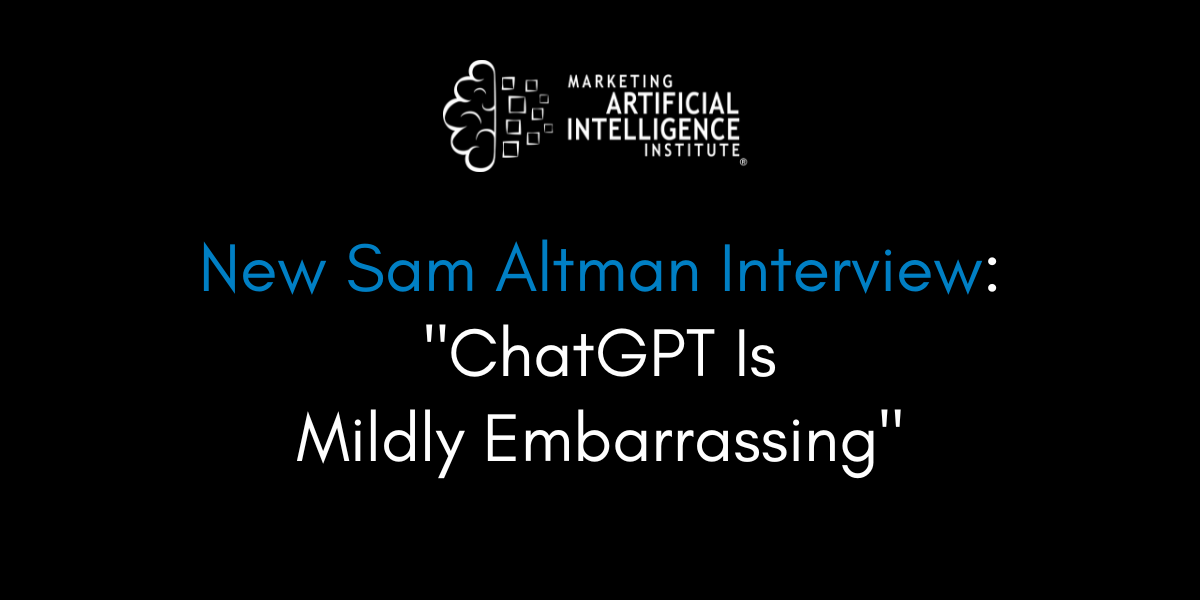Sam Altman just gave a new interview where he gave some tantalizing glimpses into the future of AI...
And had some harsh words for ChatGPT.
The interview took place at a Stanford entrepreneurship event. (Altman went to Stanford before he dropped out to focus on his first startup.)
The wide-ranging conversation covered topics from OpenAI's massive infrastructure investments to the dangers of AGI.
What can this interview tell you about where AI is going next?
I got the answers from Marketing AI Institute founder and CEO Paul Roetzer on Episode 96 of The Artificial Intelligence Show.
(And you can view the entire interview below.)
Infrastructure is all you need
First, Altman emphasized the critical importance of AI infrastructure.
There's no confirmation that OpenAI is actually raising trillions for AI chips, which has been rumored. But it's clear that AI infrastructure is top of mind for the company.
Altman said the company is intensely focused on securing the energy, data, chips, and computing capacity needed to train ever-larger models.
"They're thinking about everything that's going to be required to build much, much larger, more powerful models," says Roetzer.
This relentless focus on infrastructure may be OpenAI's secret weapon.
"He talks about that being maybe the thing that OpenAI is doing different than everybody else," says Roetzer. "The ambition with which they're looking at the amount of infrastructure needed to achieve what's ahead."
"AI and surprise don't go well together"
Second, Altman hammered home OpenAI's commitment to "iterative deployment" of AI systems.
But OpenAI intentionally ships "early and often" to avoid surprising the world with AI advancements developed in secret.
"One thing we've learned is that AI and surprise don't go well together," Altman explained.
This is why the company takes the steps it takes, like releasing its AI video generation model Sora first as a preview.
"They're trying to prepare society for what comes next," says Roetzer.
The mysterious GPT2
The comment about iterative deployment comes as the AI world is scratching its collective head over a mysterious new model that's been released.
It's called gpt2-chatbot, and some experimenters say it rivals or surpasses GPT-4...
But nobody knows who made it.
Some, however, speculate it could be an iterative test of a new OpenAI model or a new technique the company has developed that makes existing models much stronger.
Altman himself contributed to the speculation with a couple cryptic posts on X.
i do have a soft spot for gpt2
— Sam Altman (@sama) April 30, 2024
im-a-good-gpt2-chatbot
— Sam Altman (@sama) May 5, 2024
Money doesn't matter (when it comes to AGI)
While the whole GPT2 development remains shrouded in mystery, one thing is clear:
Altman and OpenAI are relentlessly focused on artificial general intelligence (AGI).
In fact, in the interview, Altman made it crystal clear that cost is no constraint in OpenAI's push towards AGI.
He believes AGI is so transformative that the pursuit of it justifies any investment. We could "burn 500 million a year or 5 billion or 50 billion a year. I don't care," Altman said.
ChatGPT is "mildly embarrassing," but not for long
Altman's pursuit of AGI is anchored in the belief that we've barely scratched the surface of what's possible with AI.
He even went so far as to call ChatGPT, with GPT-4, "mildly embarrassing," saying it "is the dumbest model any of you will ever have to use again by a lot."
Altman went on to say that we can expect models to become much smarter—and not just in a handful of domains.
"It's just going to be smarter in the general sense," he said. "I think the gravity of that statement is still underrated."
Altman's perspective here is important to understand if you want to know where AI could go, says Roetzer.
"Whether you believe it or not, he has a very high level of confidence that there is currently no upper limit to what these models can do."
Mike Kaput
As Chief Content Officer, Mike Kaput uses content marketing, marketing strategy, and marketing technology to grow and scale traffic, leads, and revenue for Marketing AI Institute. Mike is the co-author of Marketing Artificial Intelligence: AI, Marketing and the Future of Business (Matt Holt Books, 2022). See Mike's full bio.



